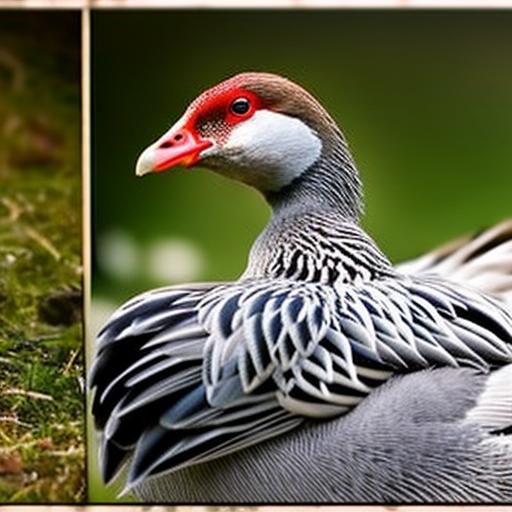Keeping geese and chickens together can be a rewarding and beneficial experience for poultry enthusiasts. Geese and chickens are both popular choices for backyard farming, and when raised together, they can complement each other in various ways. Geese are known for their excellent foraging skills and their ability to act as natural pest control, while chickens are great at producing eggs and can help keep the grass trimmed. By understanding the needs of both geese and chickens and providing them with suitable living conditions, you can enjoy the benefits of raising these two species together.
Key Takeaways
- Keeping geese and chickens together can be beneficial for both species.
- Geese and chickens have different needs and it’s important to understand them.
- Providing enough space, food, water, shelter, and nesting areas is crucial for their well-being.
- Maintaining a clean environment is essential to prevent health issues.
- Challenges may arise, but with proper care, raising geese and chickens together can be a rewarding experience.
Why Keep Geese with Chickens?
There are several advantages to keeping geese with chickens. One of the main benefits is that geese are excellent foragers and can help keep your yard or pasture free from pests. They have a knack for finding insects, slugs, and other small creatures that can be harmful to your garden or crops. By allowing geese to roam freely with your chickens, you can reduce the need for chemical pesticides and create a more natural and sustainable environment.
Another advantage of keeping geese with chickens is that they can provide protection for each other. Geese are known for their loud honking and aggressive behavior towards potential threats, which can deter predators from approaching the flock. Chickens, on the other hand, have a keen sense of danger and will often sound the alarm if they sense any potential danger. By combining the protective instincts of geese with the alertness of chickens, you can create a safer environment for your poultry.
Understanding the Needs of Geese and Chickens
While geese and chickens can be raised together, it is important to understand that they have different needs that must be met in order for them to thrive. Geese are larger birds that require more space to roam and graze compared to chickens. They also have different dietary requirements, as they primarily feed on grass, weeds, and other vegetation. Chickens, on the other hand, require a balanced diet that includes grains, seeds, insects, and kitchen scraps.
It is important to provide both geese and chickens with suitable living conditions that meet their individual needs. This includes providing sufficient space for them to roam and graze, as well as providing shelter and nesting areas. By understanding and meeting the needs of both species, you can ensure that they are healthy and happy.
Providing Sufficient Space for Geese and Chickens
Geese and chickens both require adequate space to live and thrive. Geese are larger birds that need more room to roam compared to chickens. Ideally, geese should have access to at least 100 square feet of space per bird. This can be in the form of a fenced-in yard or pasture where they can graze on grass and weeds. It is important to provide a secure enclosure for geese, as they are prone to wandering off if not properly contained.
Chickens also require space to roam and scratch for insects. They should have access to at least 10 square feet of space per bird in their coop or run. It is important to provide a secure enclosure for chickens as well, as they are vulnerable to predators such as foxes, raccoons, and hawks.
When keeping geese and chickens together, it is important to provide separate areas for them to graze and roost. This can be achieved by dividing the yard or pasture into separate sections using fencing or netting. This will allow the geese and chickens to coexist without competing for resources.
Feeding Geese and Chickens: What to Offer
Geese primarily feed on grass, weeds, and other vegetation. They have a unique digestive system that allows them to extract nutrients from fibrous plant material. It is important to provide geese with access to fresh grass and weeds on a daily basis. If you do not have enough grass or weeds in your yard or pasture, you can supplement their diet with high-quality waterfowl feed.
Chickens, on the other hand, require a balanced diet that includes grains, seeds, insects, and kitchen scraps. They should be provided with a commercial chicken feed that is specifically formulated for their nutritional needs. In addition to their feed, chickens should also have access to fresh water at all times.
When feeding geese and chickens together, it is important to provide separate feeding areas to prevent competition for food. This can be achieved by using separate feeders or by feeding them at different times of the day.
Watering Needs for Geese and Chickens

Water is essential for the health and well-being of both geese and chickens. Geese require access to clean water at all times for drinking and bathing. They enjoy splashing around in water and will often create muddy areas in their enclosure. It is important to provide a shallow pool or pond for geese to bathe in, as this helps keep their feathers clean and healthy.
Chickens also require access to clean water at all times. They need water for drinking and to help regulate their body temperature. It is important to provide a clean water source that is easily accessible to chickens. This can be achieved by using a waterer or by providing a shallow dish filled with fresh water.
When keeping geese and chickens together, it is important to provide separate watering areas to prevent contamination of the water. This can be achieved by using separate waterers or by placing them in different areas of the yard or pasture.
Shelter and Nesting Areas for Geese and Chickens
Both geese and chickens require shelter and nesting areas to feel safe and secure. Geese do not require elaborate housing structures like chickens do, but they do need a sheltered area where they can seek refuge from extreme weather conditions. This can be a simple three-sided shelter or a small shed that provides protection from rain, wind, and sun.
Chickens, on the other hand, require a secure coop that protects them from predators and provides a comfortable environment for roosting and nesting. The coop should be well-ventilated and provide enough space for the chickens to move around. It should also have nesting boxes where the hens can lay their eggs.
When keeping geese and chickens together, it is important to provide separate shelter and nesting areas for each species. This can be achieved by using separate coops or by dividing the coop into separate sections using wire mesh.
Maintaining a Clean Environment for Geese and Chickens
Maintaining a clean environment is essential for the health and well-being of both geese and chickens. Geese are known for their messy habits and can create muddy areas in their enclosure. It is important to regularly clean their living space and remove any accumulated waste or debris. This will help prevent the spread of disease and keep the area clean and hygienic.
Chickens also require a clean living environment to prevent the spread of disease. The coop should be cleaned on a regular basis, with soiled bedding removed and replaced with fresh bedding. It is also important to regularly clean the nesting boxes to prevent the buildup of bacteria.
When keeping geese and chickens together, it is important to provide separate areas for them to live and roam. This will help prevent cross-contamination of waste and reduce the risk of disease transmission.
Potential Challenges of Keeping Geese with Chickens
While there are many benefits to keeping geese with chickens, there are also potential challenges that you may encounter. One challenge is that geese can be aggressive towards chickens, especially during breeding season or when they feel threatened. It is important to monitor their behavior and intervene if necessary to prevent any harm to the chickens.
Another challenge is that geese can be messy and may create muddy areas in their enclosure. This can make it difficult to keep their living space clean and hygienic. Regular cleaning and maintenance are essential to prevent the buildup of waste and bacteria.
Enjoying the Benefits of Raising Geese and Chickens Together
Keeping geese and chickens together can be a rewarding and beneficial experience for poultry enthusiasts. By understanding the needs of both geese and chickens and providing them with suitable living conditions, you can enjoy the benefits of raising these two species together. Geese can help control pests and provide protection, while chickens can provide eggs and help keep the grass trimmed. By providing sufficient space, suitable food and water, shelter, and a clean environment, you can create a harmonious environment for geese and chickens to thrive. So why not give it a try and enjoy the benefits of raising geese and chickens together?
If you’re considering keeping geese with chickens, it’s important to understand the specific requirements and considerations involved. One helpful resource is an article on Poultry Wizard titled “How to Care for Goslings.” This article provides valuable insights into raising and caring for goslings, which can be useful when introducing geese to your existing chicken flock. To learn more about this topic, check out the article here.
FAQs
What are the benefits of keeping geese with chickens?
Keeping geese with chickens can provide several benefits such as increased protection against predators, improved foraging, and better egg production.
What are the basic requirements for keeping geese with chickens?
To keep geese with chickens, you need a secure coop and run, access to clean water, and adequate space for both species to move around freely.
What type of geese are best suited for cohabiting with chickens?
Toulouse, Pilgrim, and Chinese geese are some of the best breeds for cohabiting with chickens due to their docile nature and compatibility with other poultry.
What should be the ratio of geese to chickens?
The ideal ratio of geese to chickens is one goose for every 4-5 chickens. This ensures that the geese do not become too aggressive towards the chickens.
What should be the feeding requirements for geese and chickens?
Geese and chickens have different dietary requirements, so it is important to provide separate feeders for each species. Geese require more greens and grains, while chickens need a higher protein diet.
What are the potential risks of keeping geese with chickens?
The main risk of keeping geese with chickens is the potential for aggression towards the chickens, especially during breeding season. Additionally, geese can be carriers of diseases that can be transmitted to chickens.
Meet Walter, the feathered-friend fanatic of Florida! Nestled in the sunshine state, Walter struts through life with his feathered companions, clucking his way to happiness. With a coop that’s fancier than a five-star hotel, he’s the Don Juan of the chicken world. When he’s not teaching his hens to do the cha-cha, you’ll find him in a heated debate with his prized rooster, Sir Clucks-a-Lot. Walter’s poultry passion is no yolk; he’s the sunny-side-up guy you never knew you needed in your flock of friends!







